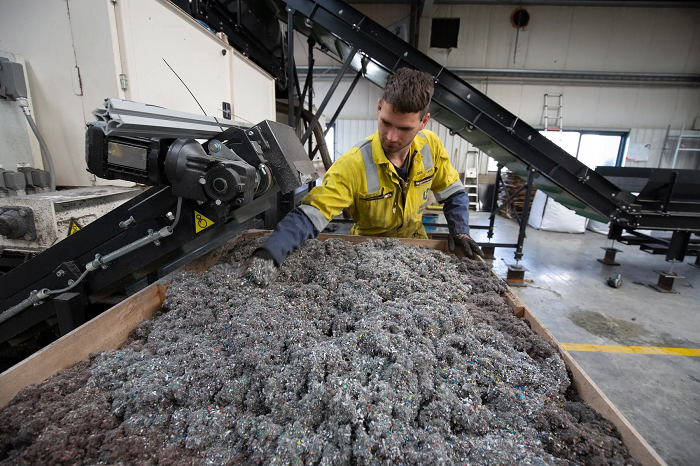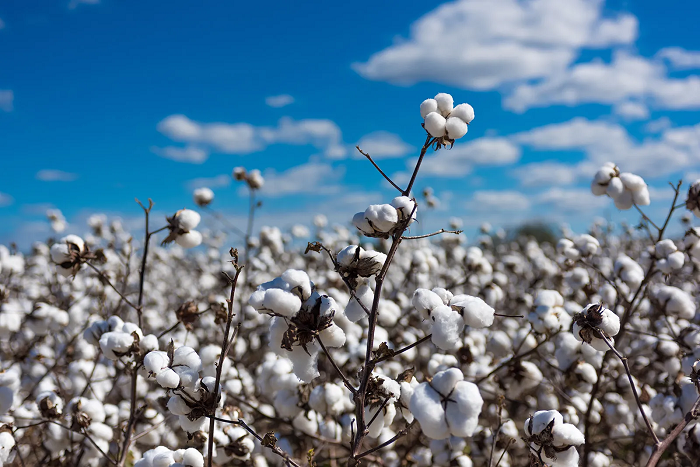FW
The Source Denim section of Fashion SVP aims to support the growing London denim community by offering both a national and international platform for all denim lovers in its coming edition June 26-27 in London
It will host a number of international denim manufacturers including; Soorty, Siddiqsons, Spy Denim, Marjomotex, Suryalakshimi, Hengfeng Weave, Nassa Denim, Neela Blue, Anubha Industries, GIFF Textile, KG Fabrics, Enkay, Billoomi, etc.
Source Denim will provide solutions and inspiration for raw denim, selvedge, non-selvedge, trend setting styles and craft denim and so many different washes and treatments, to chain-stitched, dyed, organic, ethical, sustainable and all types of designs.
The producers will offer a variety of services including full service and high quality CMT, specialist processes and fabric ranges, design and product development, complex garments, technical services and QC, and in-house services including washing, dyeing and garment testing.
In addition, Fashion SVP will also present Sourcing Briefing seminars, where leading speakers will discuss topics such as Future proofing for sustainable growth, Supporting a trail blazing brand, The new face of Denim – Innovation and future trends and more.
Fashion Station, where industry professionals will be sharing insight and tips on how to finance your business, career progression and legal issues that new and existing businesses might face.
The Ministry of Education and University Grants Commission (UGC) n cooperation with Gesellschaft für Internationale Zusammenarbeit (GIZ ) are jointly implementing a project to reduce the skill gap of mid-level managers in the country’s textile and Readymade Garments (RMG) sector.
The project, titled “German-Bangladesh Higher Education Network for Sustainable Textiles (HEST), has developed three university partnerships among four German and eight Bangladeshi universities.
The four German universities are Hof University of Applied Sciences, Chemnitz University of Technology, Dresden University of Technology, and University of Stuttgart. The eight Bangladeshi universities include Ahsanullah University of Science and Technology, Asian University for Women, Bangladesh University of Textiles, BGMEA University of Fashion and Technology, Chittagong University of Engineering and Technology, North South University, Notre Dame University Bangladesh and University of Liberal Arts Bangladesh.
The HEST project will play a vital role in reducing the skill gap of the textile industry besides addressing the sustainability challenges of higher education.
Karl Mayer has been operating successfully in the Chinese woven glass fabric market with its sizing and warping machines.
Buyers include existing customers, who are expanding or upgrading their capacity, but also companies that are new to the woven glass fabric sector.
Woven glass fabrics are mainly used as the carrier material in the production of copper clad laminates.
Karl Mayer owes its success in the glass market to its sophisticated warp preparation process. This process uses the principle of single-end sizing: the yarns are taken off from bobbins, fed through the sizing bath, dried, and wound onto beams. These are then assembled to produce warp beams for weaving. The company can supply the right machine technology for every processing stage.
The warp preparation sequence for processing glass can be adapted flexibly to suit the intended end-use, especially in terms of the tension regulation and the arrangement of the drying zone. For example, the number of drying cylinders can be varied as a function of the yarn count.
A machine for processing extremely fine glass yarns was successfully installed in February 2018. Experience with processing these fine yarns was also gained during a project that involved the upgrading and modification of older machines.
Karl Mayer is a warp knitting machinery manufacturer.
M.i.h. is launching its most sustainable jeans yet.
The capsule collection is made in partnership with ISKO, the only denim mill in the world that’s been awarded the EU Ecolabel and Nordic Swan Ecolabel environmental certifications. The fabric that has been developed is a special 10-ounce, two-by-one selvedge denim made from organic cotton in a raw indigo wash, which reduces water waste. It is available in an inky, deep-blue rinse cut in fresh silhouettes, like a wide-leg crop, a button-through skirt, and an apron top.
M.i.h. is also introducing a new upcycling initiative where customers can send their jeans to the factory to be responsibly upcycled.
It’s part of a greater movement of brands taking responsibility for the full life-cycle of their garments.
The team will be transforming the old denim pieces into new products, or will break down the fibers to create recycled yarn.
The basic blue jean may become entangled in a trade war between the US and its allies.
Following the start of US duties on imported metals from EU, Mexico and Canada, denim brands expressed their concern that tariffs will be placed on goods like jeans and consequently could raise prices for consumers worldwide.
The US has imposed a 25 per cent tariff on steel imports and a ten per cent tariff on aluminum imports from the European Union (EU), Canada and Mexico, ending a two-month exemption.
The EU says it would respond in a firm and united manner to the tariffs.
Levi Strauss & Co. will work with industry peers to raise awareness of how the tariffs will affect their business, consumers and the people across their supply chains. Levi’s has called for open markets and free trade where everyone plays by the rules.
Abercrombie & Fitch has been taking steps to reduce its dependence on China and increase the agility of its supply chain. The turnaround appears to be taking effect. Net sales for the first quarter were up 11 per cent with comparable sales ahead five per cent.
Unilateral tariff impositions risk retaliation and destabilizing the global economy, in which case American brands, workers and consumers will ultimately suffer.
Grassroots coding in the wool industry is the winning idea for Australian Wool Innovation’s 2018 Tech eChallenge.
Fending off a number of innovative business ideas that addressed areas of the wool industry such as race-line double handling and on-farm disease testing, Grassroots Coding identifies an opportunity for connecting children to the wool industry through coding. Grassroots Coding is a collaboration between Trent Bowden and Daniel Ng. Their app aims to encourage literacy in coding among young people who have in interest in the wool industry and technology.
Tech eChallenge brings young minds to everyday issues faced by woolgrowers. Teams comprising students, staff and the wider community undertook an intensive workshop course over the past three months to give them the skills to develop practical, low-cost digital tools to help wool producers improve animal health, welfare and productivity.
Participants came up with ideas and developed products they then pitched to a panel of expert judges in the Grand Final held at the University of Adelaide.
The Tech eChallenge teaches concepts to help foster innovation in a fun and open environment, with opportunities to discuss ideas with industry professionals one-on-one and to also openly brainstorm with the class, both helping to refine and cultivate the final product.
Subsidiary of Indorama Ventures, FiberVisions Corporation, has expanded its bicomponent fibre capacity in Covington, Georgia, US. This new project will be the company’s major line for producing bicomponentfibre, with 24,000 tons per year capacity, and will have state-of-the-art technology to create a new generation of bicomponent fibres.
The ground-breaking design and performance characteristics of these novel fibres will be shared with the strategic partners closer to the start-up date.
The new line will create a site with four bicomponent lines servicing the Americas and Europe and represents one piece of an expansion plan promoting its bicomponent fibre growth worldwide.
Indorama Ventures and ES FiberVisions (ESFV), a joint venture between FiberVisions LLC (a subsidiary of Thailand’s Indorama Ventures PCL) and Japan’s JNC Corporation, have been successfully expanding bicomponent fibre growth on a global scale.
ES FiberVisions opened a new production facility in Rayong, Thailand in 2017; FiberVisions Corporation will be completing a debottleneck of its existing Bicomponent fiber lines in Covington in the summer of 2018; and the previously announced investment to double the capacity of ES FiberVisions Suzhou plant to over 28,000 tons per year capacity in Jiangsu Province, China, will be completed in the summer of 2019.
Vardhman Textiles has gone into printed fabrics. The printed fabric facility with an annual capacity of nine million meters in Himachal Pradesh has state-of-the-art technology suitable for woven, knitted and non-woven fabrics.
The company has incurred a capital expenditure of around Rs 2,000 crores in the last five years. Currently it operates at near 100 per cent utilisation levels in the yarn business, catering to diverse customer requirements. It manufactures a wide range of textile products across yarn, fabrics and fiber and has the operational flexibility to strengthen it further.
Besides cotton yarn and blends, it is looking at more synthetic and blended yarns and is also taking steps to expand its existing fabric processing capabilities.
Vardhman has improved its technology platform, so that its process automation, product quality and monitoring processes can be upgraded to deliver higher and better output. The company’s technological capabilities have accelerated data-driven analytics and decision-making, enabling it to capitalise on opportunities at a faster rate.
The company is one of the largest textile companies in India manufacturing cotton yarns and fabrics, constituting about two per cent of the country’s yarn production. The fabric processing capacity is 110 million meters a year. The product basket is diversified. It is now not only in cotton but creates blends like cotton tencel stretch, cotton modal super stretch and difficult products like bi-stretch.
Textile production in Germany increased by 1.7 per cent in the first quarter, whereas clothing production volume decreased by three per cent.
Indicators for order intake worsened compared to former months. Order intake for textiles was declining in March and also markedly for clothing in the first quarter.
Production prices increased slightly, for textiles by 1.4 per cent and for clothing by 0.6 per cent.
Proceeds of clothing retailers increased 2.8 per cent in the first quarter.
Textile exports rose 0.2 per cent. Clothing exports rose six percent. The total increase was 3.8 per cent. By contrast, imports decreased by 2.7 per cent. Thus the trade surplus diminished by 16.6 per cent.
Raw material imports decreased by 9.3 per cent.
The occupational rate of the clothing and textile sectors rose slightly by 0.2 per cent.
Uncertainties in the economy and in the foreign policy are growing. However the indicators for proceeds and occupation are easing. It has to be seen if the economy after a sedate start in 2018 will swing forward.
The overall economic situation has been one of stagnation. And textiles and clothing were no exception to the trend.
Three new reports by a coalition including the Asia Floor Wage Alliance (AFWA) have documented gender based violence (GBV) in the supply chains of a number of fashion brands including Gap and H&M.
These reports include accounts of widespread physical violence, forced overtime, and sexual harassment against women across Asian countries including India, Bangladesh, Cambodia, Indonesia, and Sri Lanka.
The report focuses on gender based violence in the H&M garment supply chain. It includes reports of women working in factories in the brand’s supply chain, including in Indian factories, who have experienced both GBV and sexual harassment.
Report clearly shows the need of continuously addressing these issues.
Nine garment factories that supply clothing to Gap and H&M were investigated by the coalition between January and May this year. Each factory investigated was found to be problematic.











